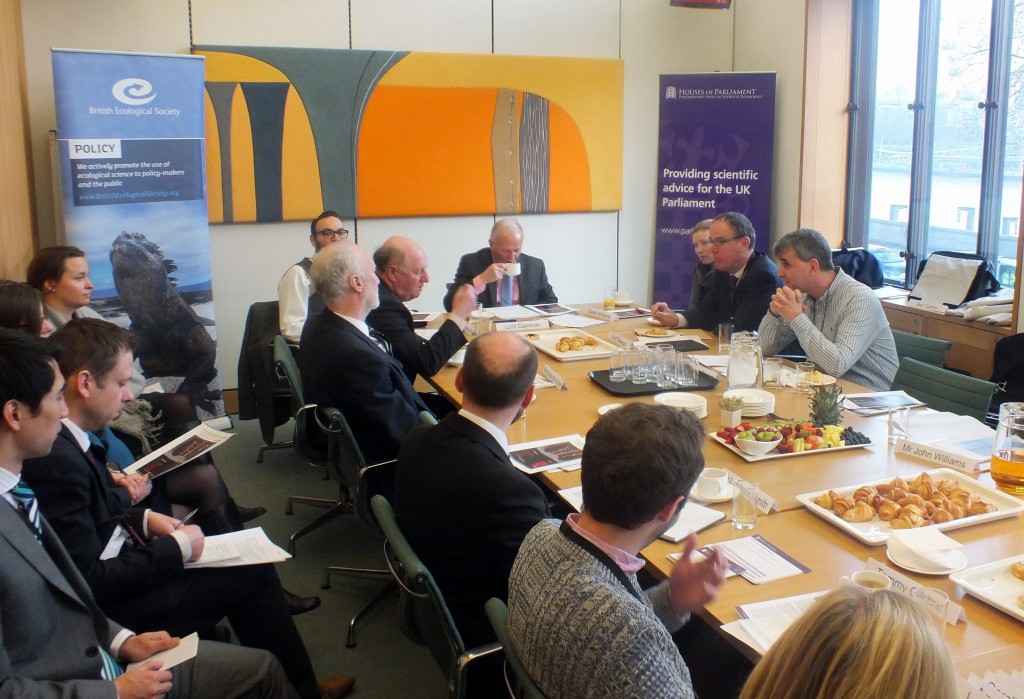If Not You, Who?
By Jonathan Wentworth, Parliamentary Office of Science and Technology
Last month, the Zoological Society of London together with the British Ecological Society organised a one day symposium, entitled “ The Conservation Science Policy/Interface: Challenges and Opportunities”. Acting as the launch event for the BES’s revitalised Conservation Special Interest Group, the symposium brought together over 150 scientists, conservationists and policy-makers to explore how the links between science and policy can be strengthened. Among the speakers was Jonathan Wentworth, who is a UK Parliamentary Office of Science and Technology adviser, as well as a member of the BES’s Public and Policy Committee. This blog post is an account of the talk he gave at this event.

The UK Parliament draws upon a range of information to scrutinise Government legislation and policy, including research evidence submitted by learned societies, universities and individual academics. An evaluation by the Policy Institute at King’s College London of the 2014 REF found that the most frequent forms of policy impact cited were parliamentary scrutiny and informing government policy. A total of 265 case studies specifically mentioned select committees and in 32 instances select committee reports cited the research in the case study (King’s College London and Digital Science, 2015). All Select Committees need evidence to be submitted, but some use evidence from environmental sciences more than others, including the House of Lords EU Subcommittee D on Agriculture, Fisheries, Environment and Energy, House of Lords Science and Technology Select Committee, House of Commons Environmental Audit Committee, House of Commons Environment Food and Rural Affairs Select Committee, House of Commons Energy and Climate Change Committee and the House of Commons Science and Technology Committee. The select committees all have webpages on the parliamentary websites on which calls for evidence are published and you can subscribe to e-mail alerts here.
However, the role of scientists as policy advisers on complex environmental issues is not always clearly defined and it may vary depending on the type of problem and other factors, such as the type of knowledge the expert has, their values, the organisation they work for or the broad societal context (Spruijt et al., 2014). In addition, while the political system requires the involvement of scientists, those seeking to promote evidence need to be aware of the limitations of evidence and expert judgement within political debates (Pielke Jr, 2008). As Professor Dan Sarewitz has noted, the willingness of groups within civil society to accept evidence and scientific evidence can depend on the extent to which their interests and values are taken account of by policymakers (Sarewitz, 2011), and Professor Dan Kahan has highlighted the role of motivated reasoning where scientific evidence has become contested as part of such debates (Kahan, 2014). In response to contestation of evidence, government departments increasingly require that evidence should be relevant to the policy issue, scientifically tenable and robust under societal scrutiny (van der Sluijs et al., 2008).
Parliamentary technology assessment institutions, such as the Parliamentary Office of Science and Technology (POST), provide a ‘safe space’ for managing different values in the science community, presenting the plurality of evidence and the limits of knowledge to politicians (PACITA, 2015). This is to clarify different perspectives and provide analysis of the issues at stake (including ethical, legal and societal dimensions), as simplifying ill-structured problems can lead to elements relevant to some actors being overlooked or denied (Hisschemoller & Hoppe, 1996). Although your research evidence may be contested in such ‘messy’ policymaking arenas and processes, if you don’t promote it, who will?
POST’s publications and details of events are available here and you can sign up to our mailing list via post@parliament.uk.
References
Hisschemoller & Hoppe (1996) Coping with Intractable Controversies: The case for problem structuring in policy design and analysis. Knowledge and Policy vol. 8, Winter 1995-96, pp. 40-60.
Kahan (2014) Making Climate-Science Communication Evidence-based – All the Way Down, Culture, Politics and Climate Change, eds. M. Boykoff & D. Crow, Routledge Press.
King’s College London and Digital Science (2015) The nature, scale and beneficiaries of research impact: An initial analysis of Research Excellence Framework (REF) 2014 impact case studies, Research Report 2015/01.
PACITA (2015) TA as an Institutionalised Practice: Recent National Developments and Challenges
Pielke Jr (2008) The honest broker: making sense of science in policy and politics. Cambridge University Press.
Sarewitz (2011) Does Climate Change Knowledge Really Matter? Wiley Interactive Reviews (WIREs) Climate Change, 2(4).
Spruijt et al. (2014) Roles of scientists as policy advisers on complex issues: A literature review. Environmental Science and Policy 40, 16-25.
van der Sluijs et al. (2008) Exploring the quality of evidence for complex and contested policy decisions. Environ. Res. Lett. 3 024008 doi:10.1088/1748-9326/3/2/024008
Like what we stand for?
Support our mission and help develop the next generation of ecologists by donating to the British Ecological Society.